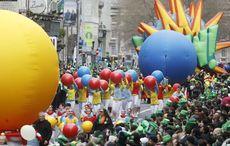NBC viewing numbers for the St. Patrick’s Day parade in New York dropped sharply this year, with only 213,200 tuning in. The numbers the previous two years were 278,900 in 2013 while in 2012 the numbers were 345,600.
That represents an almost 25 percent drop since 2013 and a close to massive 40 percent drop since 2012. By way of contrast, the Macy’s Thanksgiving Parade attracts 44 million viewers every year.
While Monday, the day the parade took place in 2014, is not the ideal day for TV coverage the controversy around the parade and the boycott also seems to have hurt the numbers.
The low viewing figures create the possibility that NBC may review their coverage of the parade given that many other former sponsors – such as Heineken and Guinness – are now boycotting. During the parade NBC showed several house advertisements making clear they stood for equality for all.
The lower viewing numbers will be a cause of great concern to parade authorities, already facing major pressure due to the negative media focus on the parade following their decision to continue to ban any gay group from marching.
Parade chairman John Donleavy, speaking at the Kerry Association dinner on Friday night, struck a defiant note saying the parade had overcome adversity and would continue in its current format. Sources close to Donleavy say he will not change his stance on gay groups marching.
If so Mayor Bill de Blasio may well bring new pressure to bear on permits and the length of the route, say City Hall insiders. In addition, financing may become a huge issue for the parade if advertisers decide to boycott.
Without NBC's coverage advertising would be even more difficult to find.
Meanwhile, the Wall Street Journal has pointed out that corporations such as Guinness are ahead of public opinion when it comes to issues such as gay rights.
"I think what is historically correct is that corporate America – Fortune 500-type companies – has generally been ahead of public opinion and certainly ahead of federal and state laws on LGBT policies," Gary Gates, an economist at the Williams Institute at UCLA. told the Journal.




Comments